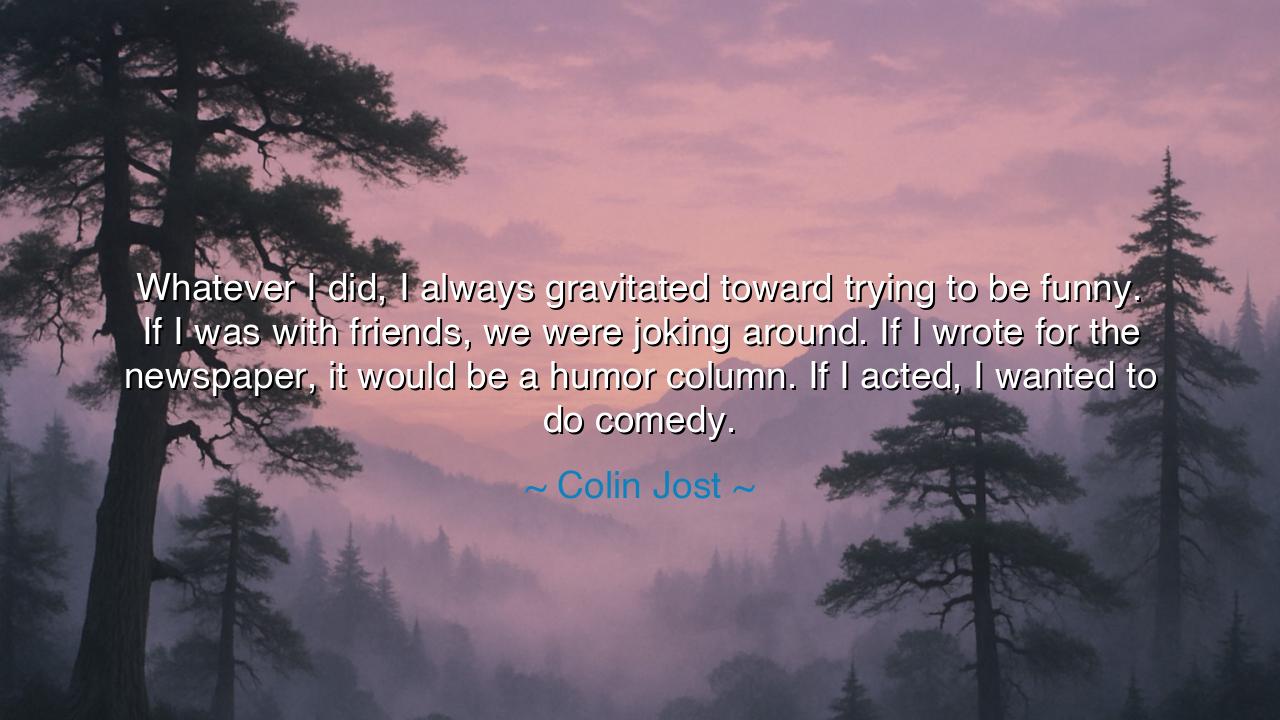
Whatever I did, I always gravitated toward trying to be funny. If
Whatever I did, I always gravitated toward trying to be funny. If I was with friends, we were joking around. If I wrote for the newspaper, it would be a humor column. If I acted, I wanted to do comedy.






In the words of Colin Jost, there resounds the eternal heartbeat of one who was born not merely to live, but to make others laugh: “Whatever I did, I always gravitated toward trying to be funny. If I was with friends, we were joking around. If I wrote for the newspaper, it would be a humor column. If I acted, I wanted to do comedy.” Beneath this confession lies not a casual remark, but a profound revelation of the soul’s calling—the irresistible pull toward joy, toward the sacred art of laughter. For in every age, there have been those chosen not to wield the sword or the pen of solemn wisdom, but the gentler weapon of wit, which pierces despair and leaves the heart lighter than before.
The origin of this quote lies in Jost’s lifelong devotion to humor—a devotion not born of chance, but of instinct. From his youth as a student writer to his work on Saturday Night Live, he has followed that inner compass pointing always toward comedy. His words echo an ancient truth: that a person’s true calling is revealed by what they are drawn to, again and again, regardless of circumstance. Just as a river cannot help but seek the sea, so too does the soul gravitate toward the thing that gives it life. For Jost, that thing was laughter—the light of humor, which turns even the ordinary into something divine.
The ancients revered laughter as a sacred gift. The philosophers of Greece told of Gelos, the spirit of laughter born from the gods themselves, who brought relief to both mortals and immortals when grief grew heavy. Even Aristotle, stern student of logic, wrote that comedy reveals truth through delight—it exposes the folly of men and the absurdity of pride. To “be funny,” then, is not a trivial pursuit; it is an act of illumination, a way of teaching wisdom through joy. Colin Jost’s devotion to humor is the modern echo of this noble tradition, for his laughter—like the laughter of jesters and poets before him—has the power to reveal what is human beneath what is serious.
There is an ancient story of Democritus, the philosopher known as “the laughing man.” Though he lived in a world filled with suffering and strife, he chose to laugh at human folly rather than weep for it. When asked why, he said, “I laugh not to mock, but to understand.” His laughter was not cruelty—it was clarity. Through humor, he saw the truth of existence: that life, though fleeting, is beautiful in its imperfection. Colin Jost walks a similar path. His laughter is not escape—it is insight, a recognition that even chaos can be made bearable through comedy.
Yet Jost’s words also remind us of the constancy of purpose—that the truest calling does not waver when paths diverge. Whether with friends, in writing, or upon the stage, he sought to weave laughter into all he did. The wise would call this alignment of the soul: when one’s inner gift flows naturally into every act, so that work, play, and art become one continuous expression of being. To live thus is to live truthfully—to follow one’s nature without resistance, and to honor what one has been made to give.
But make no mistake—humor requires courage. To seek laughter amidst the storms of life is not to ignore sorrow, but to face it unafraid. The one who jokes among the weary, who writes comedy in times of chaos, performs an act of quiet heroism. Laughter is rebellion against despair. In every jest lies a small declaration of hope: that the heart, no matter how burdened, still chooses light. This is the hidden strength behind Jost’s simple words—a reminder that humor is not the absence of struggle, but its transcendence.
So, my child of the future, heed this teaching: follow what draws you again and again, for that is the voice of your true self. If you are called to laughter, give it freely; if you are called to art, to kindness, to truth—follow it without fear. Let your gift color all that you do, as Colin Jost’s humor colored every path he walked. Do not dismiss joy as small or laughter as trivial, for in a world that hungers for hope, the ability to make another smile is holy work. And remember this final truth: he who learns to laugh at life has already conquered it—for laughter is the sound of freedom, echoing even in the darkest of places.






AAdministratorAdministrator
Welcome, honored guests. Please leave a comment, we will respond soon